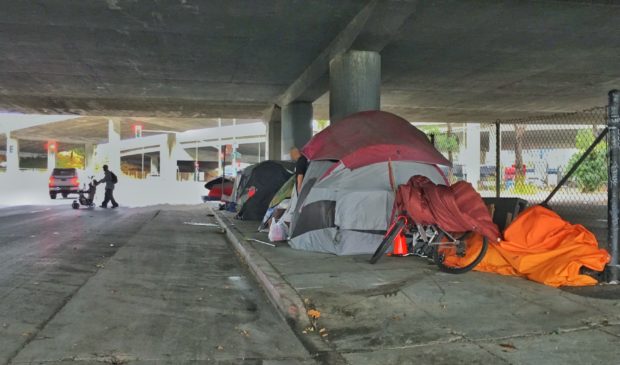Save Austin Now sues city over ballot language
Monday, February 22, 2021 by
Jo Clifton Three Austin voters who signed a petition to put a public camping ban on the May 1 ballot have filed suit against the city to force a change in the ballot language. Linda Durnin, Eric Krohn and Michael Lovins allege in their suit that the language adopted by City Council is “unfair, prejudicial and distorts the actual petition language in an attempt to intentionally bias voters” against the camping ban.
The language Council approved emphasizes that the ordinance creates a criminal offense for public camping. It says, “Shall an ordinance be adopted that would create a criminal offense and a penalty for anyone sitting or lying down on a public sidewalk or sleeping outdoors in and near the downtown area and the area around the University of Texas campus; create a criminal offense and penalty for solicitation, defined as requesting money or another thing of value, at specific hours and locations or for solicitation in a public area that is deemed aggressive in manner; create a criminal offense and penalty for anyone camping in any public area not designated by the Parks and Recreation Department?”
In contrast, the caption from the Save Austin Now petition says, “Petitioned ordinance amending City Code section 9-4-11 relating to prohibiting camping in public areas, 9-4-13 relating to prohibiting solicitation, and 9-4-14 relating to prohibiting sitting or lying down on public sidewalks or sleeping outdoors in the Downtown Austin Community Court area; and creating offenses.”
Attorneys Donna Davidson and Bill Aleshire filed the suit on behalf of the three citizens, who got help from the Save Austin Now PAC, which collected signatures to put reinstatement of the camping ban on the ballot along with the prohibition against panhandling during the overnight hours.
Council voted to eliminate the previous ordinance prohibiting sitting or lying on public sidewalks and camping in certain public areas on June 19, 2019. The new ordinance also banned aggressive confrontations, which would include panhandling. Since then, public camping has proliferated and Mayor Steve Adler has said that the camping ban repeal “isn’t working.”
The major bone of contention between the city and Save Austin Now is Council’s failure to use the caption from the petition. Petitioners used the same language on their petition as the city used in its ordinance.
Aleshire and Davidson filed the lawsuit with the 3rd Court of Appeals and the Texas Supreme Court. Aleshire explained it was necessary to start with the appellate court rather than a district court because of the short time frame. He said the 3rd Court of Appeals has requested that the city respond to the petition no later than Tuesday. Aleshire expects a ruling from the appellate court on Wednesday or Thursday.
He said Travis County Clerk Dana DeBeauvoir needs to have the final ballot language on Thursday in order to ensure that the ballots get printed in time for the May 1 election and so she can send ballots to military personnel overseas in time.
Council already has a special called meeting set for 10 a.m. Thursday to deal with items related to the recent weather, power and water emergency. The final item on that agenda is to approve an ordinance amending the previously adopted language for the Save Austin Now ballot item. Aleshire said the Austin City Charter requires Council to use the caption from the petition in setting the ballot language.
The lawsuit states that those who filed the lawsuit, called relators, are suing the city because “the city charter does not give the Council discretion to create its own ballot language when presented with a petition-initiated ordinance containing the caption, nor can the Council’s language violate” a common-law test for such language.
Aleshire, like many Austinites, was affected by the electric outage starting last Monday night, Feb. 15. He told the Austin Monitor that he was writing the ending of the lawsuit when his electricity went out. In order to complete the lawsuit, he brought a generator to his house and hooked it up to his computer. Since he had no internet service, he used his cell phone to send the documents to the court for filing.
Photo made available through a Creative Commons license.
The Austin Monitor’s work is made possible by donations from the community. Though our reporting covers donors from time to time, we are careful to keep business and editorial efforts separate while maintaining transparency. A complete list of donors is available here, and our code of ethics is explained here.
You're a community leader
And we’re honored you look to us for serious, in-depth news. You know a strong community needs local and dedicated watchdog reporting. We’re here for you and that won’t change. Now will you take the powerful next step and support our nonprofit news organization?


